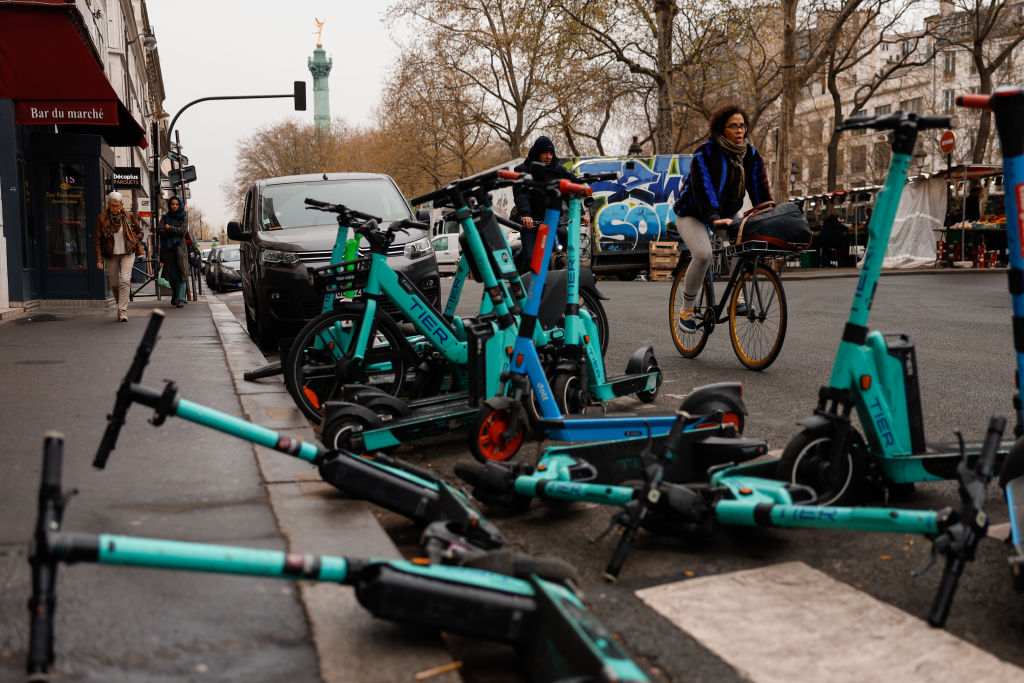Rental e-scooters have been banned from Paris since Friday after residents of the French capital were asked to decide their fate in a referendum. The vote, held in April, attracted a low turnout, with only 103,000 of the city’s 1.38 million men and women bothering to cast their ballot. Of those that did, however, 90 percent voted to rid their streets of rental scooters.
Rental scooters were first introduced onto the streets of Paris five years ago amid much fanfare. They were, claimed the company responsible, California-based Lime, the environmentally-friendly future. “Very quickly our fleet will grow to respond to demand,” claimed Lime’s director for France, Arthur-Louis Jacquier.
As Parisians soon discovered, e-scooters were a menace
The American startup chose Paris to launch its European operation because it regarded the city “as a pioneer for new forms of commuting.” Anne Hidalgo, the socialist mayor, was initially enthusiastic, seeing the e-scooter as compatible with her vision of a green future for Paris. But there were a few voices of dissent from Parisians who had read about the injuries caused by e-scooters in US cities where the craze had begun.
Lime assured Parisians that their e-scooters, which had a top speed of 15mph, would not be ridden on the sidewalks. Fat chance. As Parisians soon discovered, e-scooters were a menace, often piloted by aggressive, bearded, male millennials who regarded it as the height of amusement to weave their way at top speed along bustling pavements.
Other companies joined Lime in flooding the streets of Paris with e-scooters and there were 20,000 by early 2019. The number of accidents began to soar, prompting Hidalgo to take action. “I am asking the operators to limit the speed to 20 km/h (12mph) around the city and to 8km/h in pedestrianized streets,” she announced that summer.
But the measure had no effect. As the numbers of e-scooters continued to increase so did the accident rate, both among users and pedestrians. The most infamous incident was the death of an Italian woman in June 2021, knocked down and killed by a scooter as she talked to friends on the banks of the Seine. The pilot and the passenger didn’t stop and it took police ten days to track them down. The tipping point was 2022 when thirty-five people lost their lives because of e-scooters and more than 600 suffered serious injuries, leading Hidalgo to hold a referendum on the future of the rented e-scooter.
Few Parisians will miss them, certainly not staff at the city’s hospitals who had to treat accident victims. “The end of self-service scooters is a good thing,” said Philippe Juvin, head of the emergency department at the Georges-Pompidou European Hospital. He explained that injuries suffered by scooter users are particularly painful. “When you fall off a scooter, your face is usually smashed into the sidewalk, unlike on a bike, where you lie on your side. What’s more, a quarter of scooter falls result in fractures, the highest rate of any soft mobility activity.”
According to another ER doctor, Rafik Masmoudi, there is a difference in scooter behavior between those who own one and those who hired one. “People who buy their scooters are more responsible than those who hire them,” he said. “It’s their scooter and they often use it for everyday use rather than leisure purpose.” Personal e-scooters will be still be permitted in Paris.
Lime’s public affairs director, Xavier Mirailles, said that the company has “turned the page on scooters” for Paris and its machine will be sent to other cities in France and beyond, including London. The city’s ER departments must be thrilled at the news.
This article was originally published on The Spectator’s UK website.

























